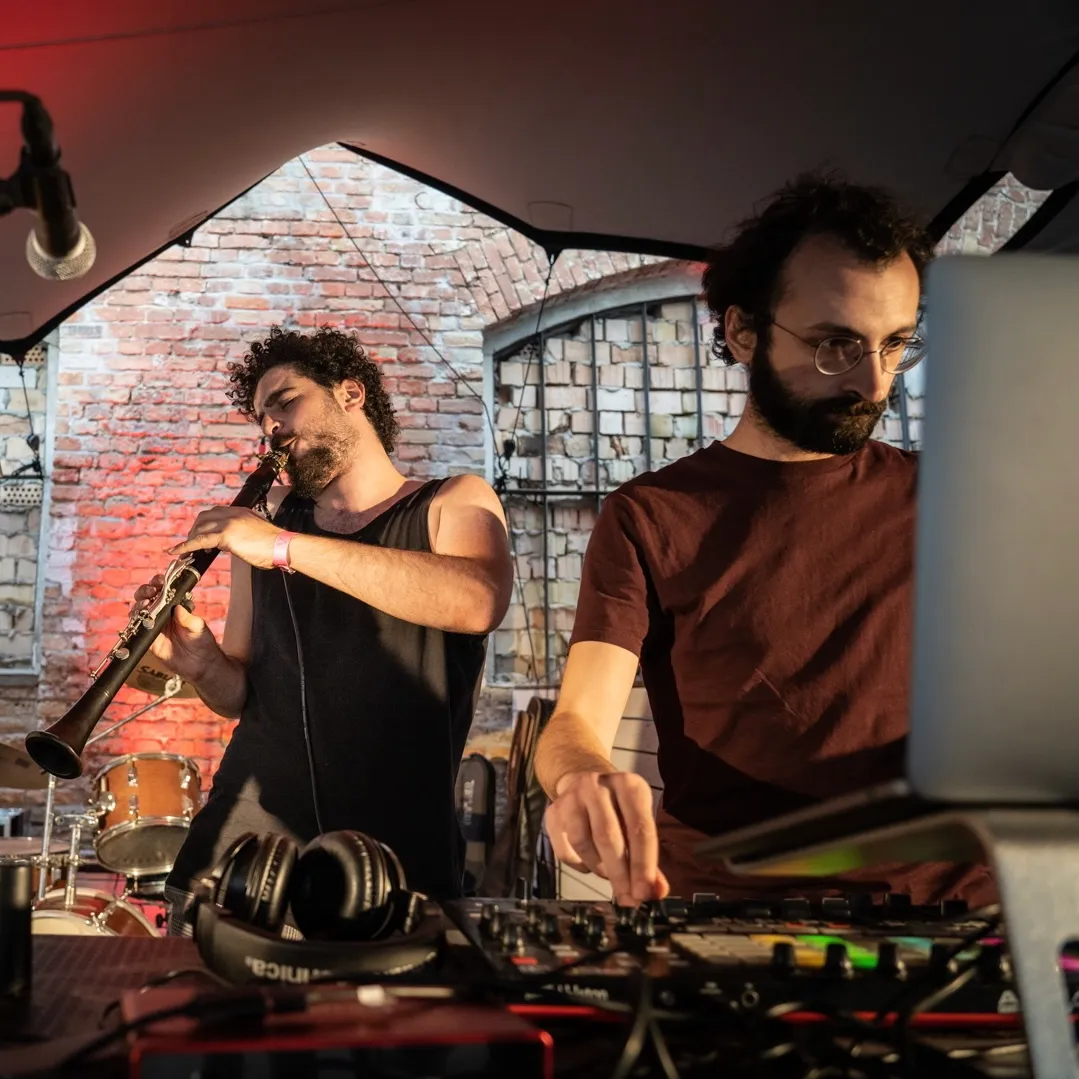In the ever-expanding landscape of music, certain bands emerge with a distinct sound and a compelling narrative that captures the imagination of listeners. Sharake, an acoustic-electronic band hailing from Syria/Germany, is one such entity. Their fusion of diverse cultural influences is gaining acclaim and admiration, and their influence is on the verge of spreading far beyond their origin in Berlin.
At the heart of Sharake lies a beautiful blend of Arabic vocals with instruments like the oud and the clarinet, playing crucial roles in creating a soulful soundscape infused with a modern electronic twist. Their music is characterised by its melodic complexity, with intricate scales that bring a wide range of emotions. The lyrics often depict tales of nostalgia, love, heroism, and socio-political references, reflecting the cultural values and beliefs of the region from which they originated: Syria.
While Sharake’s music remains deeply rooted in tradition, it has also embraced modern influences, adapting to changing tastes and preferences. Their music is a reflection of their multicultural backgrounds, blending elements of electronic, techno, house, and traditional Middle Eastern music.
The Rhythm Passport team sat down with the dynamic duo: Yazan Alsabbagh and Salеh Katbeh and charted out their musical story from Damascus to Berlin.
How did the Sharake come about, and what inspired you both to start it?
Sharake was formed in Berlin in 2023. We are both deeply influenced by the oriental music rooted in our traditional Syrian upbringing, and our extensive training in classical Syrian music. After moving from Damascus to Berlin, it came naturally for us to shift our focus to electronic music as we were inspired to learn new technologies and combine our musical instruments with the sounds of contemporary electronic music and techno. These newfound surroundings brought fresh energy into our project and pushed us to form Sharake.
How has living in Berlin impacted your sound and style?
Berlin has constantly inspired us and majorly influenced the sound and style of our music. We have worked with a lot of acoustic instruments in the past and continue to do so in our live sets while we enjoy experimenting with electronic music. We are always finding new ways of using our instruments, the oud and the clarinet, whether, in the studio or on our live sets, and it is this experimentation that keeps us excited. Additionally, the rich musical environment in Berlin inspires us to dig deeper and continuously discover ourselves as artists.
Are there any specific artists or bands, either Syrian or from other backgrounds, that have significantly influenced your musical style?
In Syria, our musical journey was heavily shaped by the alternative music scene. There are a lot of inspiring artists who are pushing the boundaries of art and music, and who can convey everyday societal issues in their music and something like this deeply resonates with us. In Europe, we draw inspiration from various artists in the melodic house and techno genres, such as Township Rebellion and Anyma, who also constantly push their boundaries and the sound of techno—this is something that inspires us. We try to bring a similar method to our work.
What role do you see your music playing in promoting cross-cultural understanding, especially given your unique background and experiences?
We hope our music will serve as a bridge between two different cultures. Our fusion of music not only introduces Western listeners to traditional Syrian musical instruments and styles but also represents Syrian and Arab styles and sounds with a modern twist. We also like to present the new modern sound of our traditional instruments to our Syrian and Arab audiences. From both of our unique backgrounds and musical experiences, we wish to make music that connects with listeners in both worlds, bringing different emotions, perspectives and stories. Through our music, we hope we can inspire more collaborations between musicians from the East and the West, challenge Arab stereotypes and promote mutual respect among people from different cultures.
Could you share a bit about your creative process for making music? What comes first and how do you build upon it?
Our creative process is quite fluid and very engaging, we are constantly improving ourselves and finding our unique ways of working with each track we produce. We do not have a set creative process as we continually learn and challenge our creative selves. Sometimes, we begin with the kick drum and make a groove around it, then complete it in a song while other times, it’s the lyrics or sometimes it’s a melody that comes first and then we build a groove around it. Each track develops differently, influenced by the mood we are in, resulting in different genres. Sometimes one of us creates the drum loop and the other makes the melodic parts. We keep the teamwork high and fill in for each other wherever needed.
What are your go-to VST/s, hardware syntherziers, plug-ins,?
We use Ableton Live for all our music productions along with a selection of our usual go-to VSTs. We are not heavy on hardware synths yet and our tools mostly include digital plugins like BigKick, Diva, Serum, and Vital. You can hear them in most of the tracks we produce. We used to buy a lot of VSTs and every Black Friday was a disaster for us because we would end up buying so many plugins. But now we have streamlined our processes and work with a few VSTs that we know well and can use to the best of our knowledge.
What impact do you hope your music will have on listeners in Syria and around the world?
We use our music to deeply connect with listeners in Syria, the broader Arab world, and beyond, hoping it serves as a source of inspiration, comfort, and connection. By putting together different parts of our Syrian heritage and traditional sounds with electronic music, we not only aim to make people dance, which of course, we want, but also aim to evoke emotions and promote cross-cultural collaborations.


